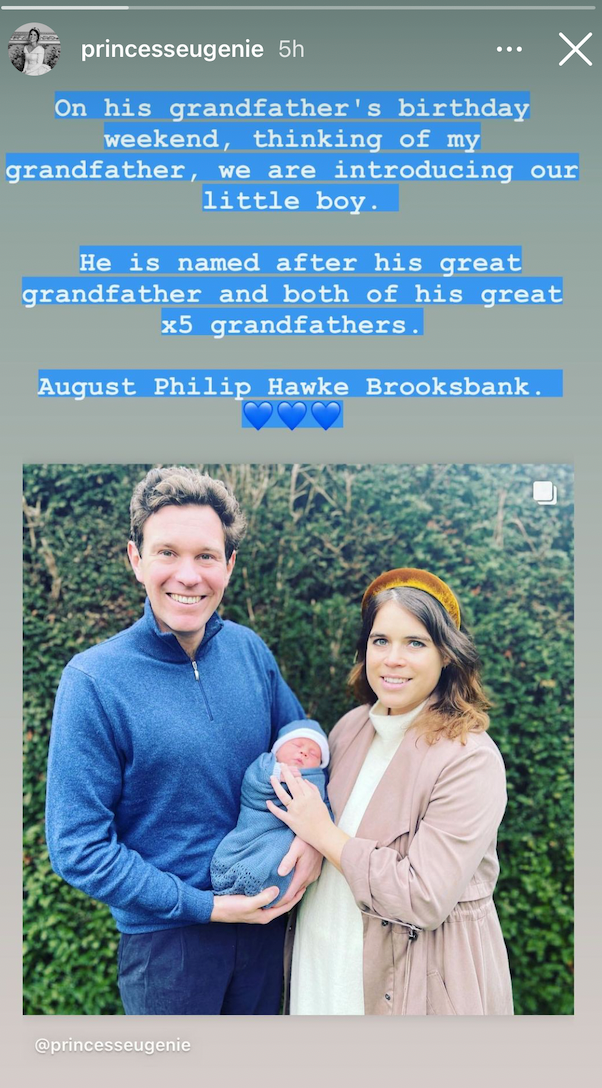Royal baby: Five rules royals follow when naming their children
Princess Eugenie and Jack Brooksbank have named their son August Philip Hawke Brooksbank
Your support helps us to tell the story
From reproductive rights to climate change to Big Tech, The Independent is on the ground when the story is developing. Whether it's investigating the financials of Elon Musk's pro-Trump PAC or producing our latest documentary, 'The A Word', which shines a light on the American women fighting for reproductive rights, we know how important it is to parse out the facts from the messaging.
At such a critical moment in US history, we need reporters on the ground. Your donation allows us to keep sending journalists to speak to both sides of the story.
The Independent is trusted by Americans across the entire political spectrum. And unlike many other quality news outlets, we choose not to lock Americans out of our reporting and analysis with paywalls. We believe quality journalism should be available to everyone, paid for by those who can afford it.
Your support makes all the difference.Princess Eugenie and Jack Brooksbank have announced the name of the newest member of the royal family, their son, August Philip Hawke Brooksbank.
The couple, who welcomed their first child on 9 February 2021, shared the baby’s name along with three new photos on Instagram, where they revealed that he is named after Eugenie’s grandfather, Prince Philip.
“He is named after his great-grandfather and both of his great-great-great-great-great-grandfathers,” Princess Eugenie wrote on her Instagram Stories alongside a photo of herself and her husband holding the newborn.
The name reveal of the latest addition to the royal family comes after the couple broke from royal protocol when they announced the baby’s birth on Instagram, where they also shared the first photo.
However, it seems that Princess Eugenie and Mr Brooksbank have followed some of the rules that members of the royal family typically follow when naming royal babies.
These are some of the unusual rules royals consider when naming their children.
Many royal babies do not have a surname
Like most royals, royal babies typically do not have a surname. However, there are some exceptions, such as in the case of Prince Harry and Meghan Markle’s son Archie, who was given the last name Mountbatten-Winsor, the name used by members of the royal family when a surname is needed.
Prince William and Kate Middleton’s children Prince George, Princess Charlotte and Prince Louis do not have an official surname, however, they use Cambridge when required, such as at school, in honour of their parent’s assigned dukedom.
When Princess Eugenie married Mr Brooksbank, she took his last name, effectively changing her title to HRH Princess Eugenie, Mrs Jack Brooksbank.
It then makes sense that the couple decided to bestow the last name of the baby’s father on their newborn son.
The parents choose at least three names
Babies born into the royal family are typically given multiple names at birth, many of which honour members of their family.
Prince William, for example, has four names, while all of his and the Duchess of Cambridge’s children each have three names.
Princess Eugenie kept with tradition when she gave her son three names.

The child’s first name appears to honour his great-great-great-great-great-grandfather Prince Albert, while his first middle name is in tribute to his great-grandfather, Prince Philip.
Hawke reportedly comes from the baby’s other great-great-great-great-great-grandfather, Reverend Edward Hawke Brooksbank.
Unique names are allowed further down the line of succession
Many members of the royal family share names, with12 royal babies being named Albert in the family since Queen Victoria’s birth in 1819 and nine Victorias over the past two centuries.
However, as a general rule, the further down the line of succession, the more acceptable it is for a royal to grant their child a unique name.
“The further down the line of succession, the more likely you are to have a more unique or untraditional name,” said Carolyn Harris, professor of history at the University of Toronto School of Continuing Studies and author of Raising Royalty: 1,000 Years of Royal Parenting.
Princess Eugenie is 10th in line to the throne, with her son in 11th place, so it is likely she and her husband were given more freedom with the baby’s name.
The Queen doesn’t have to give her approval - but she is told beforehand
Per royal protocol, members of the royal family typically share the name they have chosen for their child with Queen Elizabeth II before announcing it.
However, that doesn’t mean that the monarch has to approve the name, as it’s mostly an “informal conversation,” according to royal commentator Kate Williams.
But, if the Queen disapproves of the name for any reason, it is likely that the name will be changed.
“Of course they have such respect for the Queen that if she says ‘I really don’t like that name,’ they’d definitely take that into account,” Williams said.
Titles are bestowed by the Queen
While the Queen does not decide the baby’s name, nor does the decision require her approval, it is up to the monarch to bestow a title on the child if she decides.
It is unlikely that August Philip Hawke Brooksbank will receive a royal title, as he was born down the female line of the royal family. Instead, he will be known as Master August Brooksbank.




Join our commenting forum
Join thought-provoking conversations, follow other Independent readers and see their replies
Comments